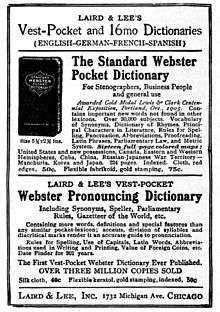Pocket edition

A pocket edition is an edition of a book that has been altered to fit in the reader's pocket, usually by using thinner paper, smaller print, and abbreviation of the text:
When a publisher wishes to produce a pocket edition of a book he can reduce the size of the print, and the thickness of the paper and covers; but he cannot do this indefinitely if the book is to remain legible and serviceable; a time comes when he must also abridge the text, abbreviating of cutting out any appendices or other portions, which, though perhaps interesting in themselves, are not really necessary to the main purpose of the work.[1]
Pocket editions have been criticized as "not really suitable for library use", with the recommendation that "those bought to cover gaps when no alternative was available should be relegated to reserve as soon as they can be replaced".[2]
One kind of book popularly issued in the pocket format is the pocket dictionary as an edition of larger dictionaries. A pocket dictionary generally "contains no more than 75,000 entries",[3] with abbreviated information about each entry, compared to the 170,000 entries or more of a typical desk dictionary, making the pocket dictionary inadequate for use by students beyond the high school level.[3] One critic has described the pocket dictionary as "almost worthless, except as a flimsy guide to spelling and pronunciation".[4] A countervailing view is that although a pocket dictionary can not replace the desk dictionary, "as a portable learning tool, the pocket dictionary is worth its weight in gold".[5]
References
- ↑ The Journal of Conchology, Volumes 17-18 (1923), page 234.
- ↑ The Librarian and Book World - Volumes 39-40 (195), p. 341.
- 1 2 Mary Ellen Guffey, Carolyn Seefer, Business English (2010), p. 5.
- ↑ Harry Shaw, Building a Better Vocabulary (1984), p. 12.
- ↑ Walter Pauk, Ross J.Q. Owens, How to Study in College (2010), p. 133.